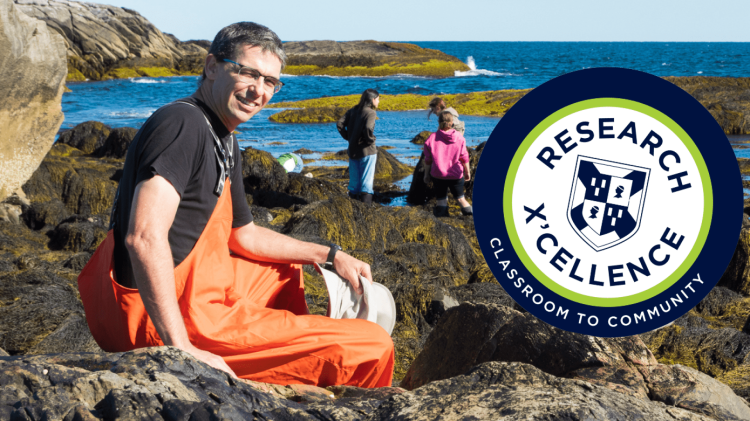Helping the Nova Scotia lobster industry move towards more sustainable bait use and developing low toxicity anti-fouling products are two of the pressing research issues underway in the lab of Dr. Russell Wyeth, professor and chair of the StFX Biology Department.
"The bait problem is already here. If my science can help with that, that would be great."
~ StFX biology professor Dr. Russell Wyeth
Dr. Wyeth studies lobster baits and behaviour; biofouling and anti-fouling; and the neurobiology (brains and behaviors) of slugs and snails.
While his three major research projects may seem disconnected at first, they're all linked by a desire to understand how animal senses work and how sensory information controls behaviour.
This understanding may have major benefits.
WORKING TOWARDS SUSTAINABLE BAIT
With nearly a dozen years of experience working in lobster bait and behaviour, Dr. Wyeth's been involved in several projects, funded by various sources. These include investigating alternative bait solutions for the lobster fishery in response to rising costs of using traditional baits and studying lobster behaviour to optimize how fishers deploy bait, which can also lead to lowering costs and increasing effectiveness.

Dr. Russell Wyeth
Lobsters navigate using odours and water flow, and fisherman exploit this by baiting their traps to attract them. However, little is known about optimal bait types and the important odours released from bait that attract lobster. Dr. Wyeth says their goal is to build understanding of lobster responses to bait by using laboratory experiments and underwater field video surveys to better understand lobster responses to natural food sources and bait. They're interested too in larger scale lobster movement patterns relative to lobster traps and analyzing molecular constituents of bait for their attractiveness to lobster.
A primary driver behind this research to is help lobster fisherman attempting to improve the cost-effectiveness of their bait use.
"The lobster fishery is a big part of the Nova Scotia economy. Usually there are lots of lobsters. From that perspective, the fishery is sustainable. Harvesters are also limited in where they can fish and the number of traps they can use. That appears to be sustainable. But they use a lot of bait to catch lobster. We need a sustainable source of bait. That's where the concern lies," Dr. Wyeth explains.
Fisheries and Oceans Canada (DFO) has closed the commercial mackerel fishery due to declining stock and the use of herring is limited too. Meanwhile, bait prices are also going up.
"The economics and science are saying the same thing: you maybe shouldn't be relying on these traditional baits," he says.
While bait, in the form of low grade fish humans won't eat, gets shipped in from around the globe, he says there are risks inherent in this practice from food safety to the carbon footprint.
The problem to solve? Finding evidence of alternative bait that is attractive to lobster and that harvesters can trust that it works.
Dr. Wyeth's lab has tested products companies are trying to develop, including from Nova Scotia and PEI-based companies using fish byproducts to create bait.
It's not a simple fix, he says.
It's not easy to ask people whose livelihoods rely on bait to test it. The other problem is if you're trying to develop bait, you want to try a few recipes to see which works best. If you try one and it doesn't work as well, you don't want a premature decision to end development.
Enter Dr. Wyeth's lab. Their role is to test bait in the field to see what the data shows.
Dr. Wyeth explains they sink metal tripods into the water and secure bait under video cameras. Currently, they have 8,000 hours of videos that students analyze, including behavioral analysis.
Invest Nova Scotia and the Atlantic Fisheries Fund have been major funders of this work in the past, along with local harvest organizations. While the work is currently paused, Dr. Wyeth says there are active conversations ongoing looking for the right opportunities.
Meanwhile, his lab is currently studying the population and behaviours of juvenile lobsters.
"We're doing it in a brand new way. We hope that information will be useful for DFO and the lobster industry as they manage the fisheries." Working in a marine protected zone where no scallop fishing is allowed, they're doing a baseline survey to determine how many juvenile lobsters are here now so that it can monitored later for possible changes in the future.
Dr. Wyeth says his interest in the lobster fishery started soon after his move to Nova Scotia, when he shifted his research to be more Nova Scotia-based.
The dwindling stocks of traditional bait concerned him on the long term sustainability of the fisheries. Plus, he wanted his research to directly help the people in his community.
The lobster fishery is a big business, but it's made up of many individuals and unlike a big company, they don't have research and development departments that constantly work on science that benefit their industry.
"The bait problem is already here," he says. "If my science can help with that, that would be great."
BIOFOULING AND ANTI-FOULING
Another long-term research project has centred on biofouling and antifouling.
Biofouling is a natural process that occurs as organism grow on any surface in the ocean. This biofouling growth on man-made surfaces affects many industries. For years, humans have been pretty good at stopping it by using toxic stuff, he says. But toxic accumulations in the environment started causing problems, leading to product bans.
For the past decade, his lab has been exploring options for low toxicity antifouling as well as partnering with industry members to collaboratively test commercial coatings.
As a marine biologist, Dr. Wyeth says he would prefer we didn't put anything toxic in the ocean. But he recognizes that biofouling causes many problems, and harmful things come as a consequence of that. "There is a need for low-toxicity anti-fouling."
His lab is one of the few studying ultraviolet light for anti-fouling.
"It is an interesting topic to study as light will never accumulate in the environment and works remarkably well," he says. "The problem is it requires continuous power. We're working to find out how to dose it and we're studying side effects like what happens if you don't have enough light."
In another antifouling project, the Wyeth Lab recently published a paper in the academic journal Biofoulin = a study on what they believe to be the first hard (durable) fouling release coating, developed with longstanding collaborator, GIT Coatings of Halifax. The coating makes it harder for organisms to stick to it, rather than killing what is sticking. This kind of coating is not new, but the added durability makes the prototypes tested by the Wyeth Lab special.
BUSY STUDENT LAB
StFX students are heavily involved in all aspects of Dr. Wyeth's work. Most summers, his lab employs about 10-15 students, and he says introducing them to science is a huge motivator. "It's really cool to see. It's really fantastic to watch their progression."
Dr. Wyeth joined the StFX faculty in 2008. Over the years, he has taught the diversity of life portion of the first year biology class; invertebrate biology,(the biology of animals without backbones), animal behavior, course-based research experience, and career development for biology students.
He's been recognized with both StFX and the Atlantic University Association of Teachers Outstanding Teaching awards. He's just received his second James Chair Award for recent research productivity and is also a recipient of an Endeavour Research Fellowship. which enabled travel to Australia to work with researchers there.












